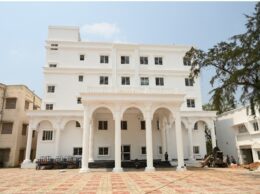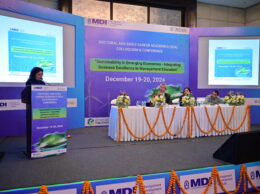Manipal, Karnataka, India: Manipal Academy of Higher Education won silver in the International Green Apple Award for Environmental best practice 2018. The award was received by Derrick I. Joshua, Assistant Director, Environment Sustainability, MAHE at a ceremony at the Houses of Parliament, London on November 12, 2018.
MAHE was selected for the award from 800 global nominations which competed to pick the greenest individuals, companies, councils and communities. The award-winning project, Green Manipal, also earned plaudits from the judges who commented;
“This private university in India is setting itself up to be a world-class green campus. They have a broad approach encompassing renewable energy, greywater systems, stringent waste management procedures and a tree-planting program that firmly establish them as one of the most sustainable universities in Asia.”
As a result of the Green Apple Award success, MAHE has been invited to have the winning paper published in The Green Book, the leading international work of reference on environmental best practice. With the win, MAHE can also take part in the Green World Awards 2019 and have 100 trees planted in their name as part of the United Nations Billion Trees initiative.
The Green Apple Environment Awards were established in 1994 as an annual campaign to recognise, reward and promote environmental best practice around the world. The awards are organised by The Green Organisation – an international, independent, non-political, non-profit environment group.
“The award recognizes MAHE’s sustainable educational campus, said Pro-Chancellor, Dr. H Ballal. “Our focus has been on aspects like waste, water, green cover and clean energy measures. Segregation of solid wastes into wet, dry, hazardous, electronic, biomedical and employing appropriate treatment measures. Water recycling and reuse of sewage, tree planting, air quality monitoring, green IT, use of examination pads, solar heating etc. are some of the measures that have helped the University to reduce carbon emissions to the tune of 66,100 metric tons of CO2e in the year 2017,” Pro-Chancellor Dr. H S Ballal added.









